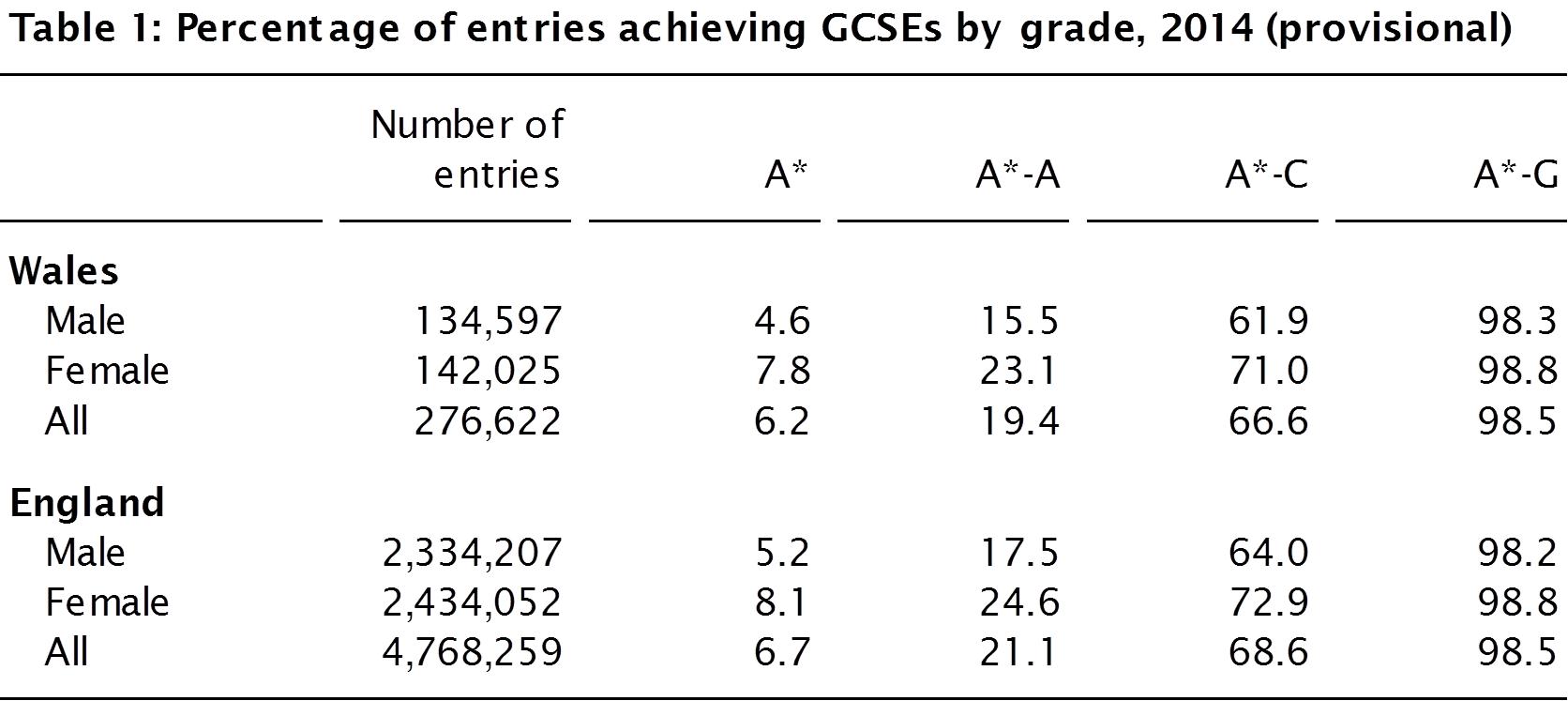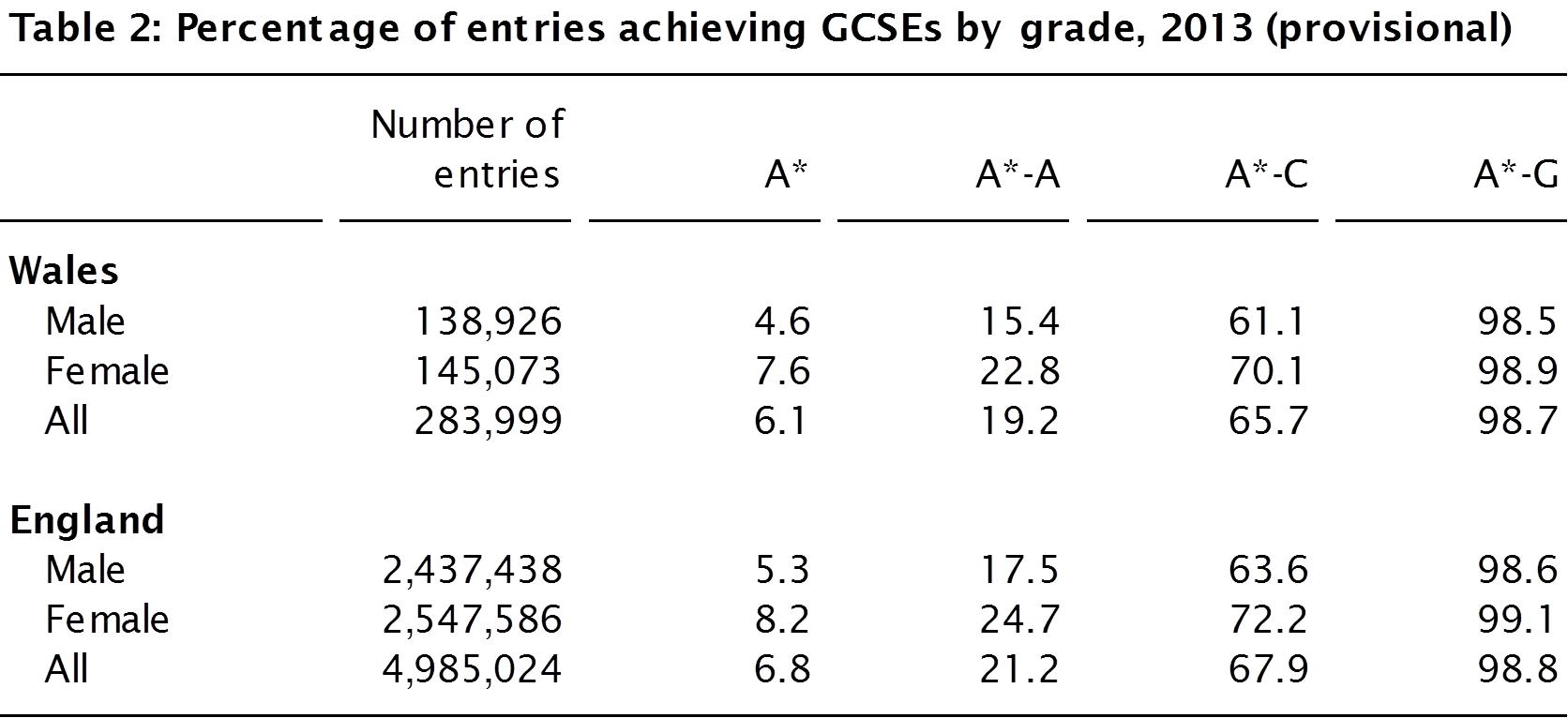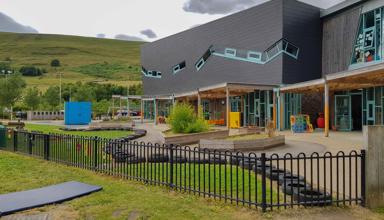Article by Sian Hughes, National Assembly for Wales Research Service
Today is the day that students in Wales, England and Northern Ireland receive their GCSE results. As with A level results, the Joint Council for Qualifications (JCQ – a membership organisation comprising the seven providers of qualifications in the UK) publish summaries of the results. The JCQ data shows the collective results of the entries of the member awarding bodies. Results The data in the tables below compare results for 2013 and 2014. This comparison is made based on the data published by JCQ on GCSE results day in 2013. Data is provisional representing the position at the time that results are issued. Data are subject to checking before final data at national (Wales), local authority and school level is published. Comparison between 2013 and 2014
- In Wales, grades have increased at grades A* for females (by 0.2 per cent) and for all pupils (by 0.1 per cent). The percentage of males achieving grade A* has remained the same;
- There have been small increases in the percentage of those achieving the highest grades of A*-A;
- There have been slightly greater increases (compared with the increases at grades A*-A) in those achieving grades A*-C for all pupils by 0.9 per cent, males (0.8 per cent) and females (0.9 per cent);
- There have been small decreases in the overall pass rate (grades A*-G);
- In England there have been increases in the percentage of all pupils, males and females who have achieved grades A*-C (by 0.7 per cent, 0.4 per cent and 0.7 per cent respectively. There have been decreases at all levels except for males achieving grades A*-A, which remains the same as 2013.
Males and females
- Girls continue to achieve better results than boys at all levels in Wales and England;
- In Wales, the gap has increased at all levels since 2013.
Wales and England
- At grades A*-G, females in Wales performed slightly better than those in England (by 0.1 per cent). The performance of all pupils and males was the same in Wales and England. At all other grades, England achievements were higher than Wales, but the gap continues to decrease.
Tables 1 and 2 show the percentage of entries in all subjects by grade for Wales and England for 2014 and 2013.  Source: Joint Council for Qualifications, GCSE and Entry Level Certificate Results Summer 2014
Source: Joint Council for Qualifications, GCSE and Entry Level Certificate Results Summer 2014  Source: Joint Council for Qualifications, GCSE and Entry Level Certificate Results Summer 2013 Welsh Baccalaureate The results of the Intermediate and Foundation Baccalaureate are also published today. There have been increases in the percentages of pupils achieving the Diploma and the Core Certificate at both levels. The number of candidates completing the programme at Foundation level is fewer than last year.
Source: Joint Council for Qualifications, GCSE and Entry Level Certificate Results Summer 2013 Welsh Baccalaureate The results of the Intermediate and Foundation Baccalaureate are also published today. There have been increases in the percentages of pupils achieving the Diploma and the Core Certificate at both levels. The number of candidates completing the programme at Foundation level is fewer than last year. 
 Source: Welsh Government Press Release Changes to exams Following widespread concerns about GCSE English Language outcomes in summer 2012, the Welsh Government developed revised subject criteria for the qualification in Wales. January 2014 was the first assessment opportunity for the specification and there were concerns expressed about lower than expected results for its early entry. A fact finding exercise on the January 2014 English results found that there was no one single factor that had solely contributed to the lower than expected outcomes in January 2014. A number of issues emerged which may have had an impact, such as higher numbers of early entry of learners for these exams. The report stated that it was expected that the cohort of learners who sit the GCSE in summer 2014 to achieve, outcomes that are broadly comparable in GCSE English Language as that age group of learners did in summer 2013. The JCQ data published today (which provides data for all entries of all ages) shows that there have been slight decreases in achievement in English GCSEs in Wales. However, the Minister for Education and Skills has said that for candidates aged 16, A*-C outcomes at 62.6 per cent are higher, by 0.6 percentage points than they were in summer 2013. There have been suggestions that schools in England may see some variability in their results following the changes to GCSEs in England announced in December 2011 which meant that assessment of GCSEs was to be linear rather than modular, that is all assessment takes place at the end of the course. Today’s results are the first to be issued under the linear model.
Source: Welsh Government Press Release Changes to exams Following widespread concerns about GCSE English Language outcomes in summer 2012, the Welsh Government developed revised subject criteria for the qualification in Wales. January 2014 was the first assessment opportunity for the specification and there were concerns expressed about lower than expected results for its early entry. A fact finding exercise on the January 2014 English results found that there was no one single factor that had solely contributed to the lower than expected outcomes in January 2014. A number of issues emerged which may have had an impact, such as higher numbers of early entry of learners for these exams. The report stated that it was expected that the cohort of learners who sit the GCSE in summer 2014 to achieve, outcomes that are broadly comparable in GCSE English Language as that age group of learners did in summer 2013. The JCQ data published today (which provides data for all entries of all ages) shows that there have been slight decreases in achievement in English GCSEs in Wales. However, the Minister for Education and Skills has said that for candidates aged 16, A*-C outcomes at 62.6 per cent are higher, by 0.6 percentage points than they were in summer 2013. There have been suggestions that schools in England may see some variability in their results following the changes to GCSEs in England announced in December 2011 which meant that assessment of GCSEs was to be linear rather than modular, that is all assessment takes place at the end of the course. Today’s results are the first to be issued under the linear model.






